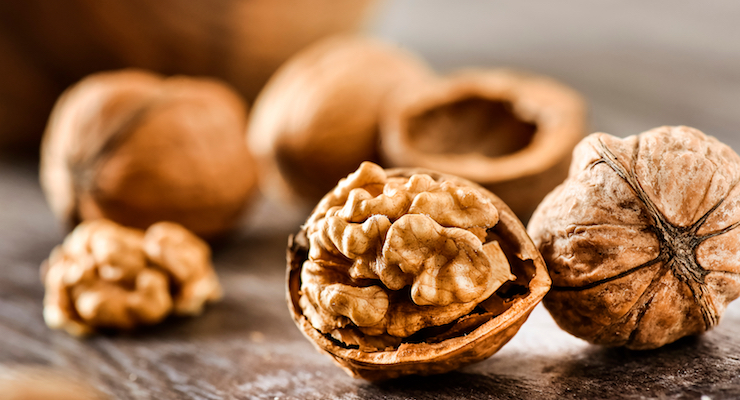11.09.20
Twin studies published in the Journal of the American College of Cardiology corroborated mounting evidence that a pro-inflammatory diet high in red and processed meats, refined grains, and sugary beverages are associated with a heightened risk of cardiovascular disease or stroke. However, this risk can be reduced by a high intake of walnuts.
Biomarkers associated with chronic inflammation are significantly affected by what we eat – certain dietary patters, which go light on pro-inflammatory foods in favor of olive oil, nuts, whole grain, fruits and vegetables, and fish, are shown to reduce concentrations of interleukins, chemokines, and adhesion molecules throughout the body.
The first study, which analyzed long-term adherence to pro-inflammatory dieting, tracked the results of men and women from the Nurses’ Health Studies I and II, starting from 1986 and including a 32-year follow up, found significant associations between pro-inflammatory foods and outcomes of heart disease, stroke, or cancer in a total of 210,000 participants. Participants’ inflammatory indexes were calculated by a dietary intake survey, taken every four years.
“Using an empirically-developed, food-based dietary index to evaluate levels of inflammation associated with dietary intake, we found that dietary patterns with higher inflammatory potential were associated with an increased rate of cardiovascular disease,” Jun Li, MD, PhD, lead author of the study and research scientist at the Harvard T.H. Chan School of Public Health, said. “Our study is among the first to link a food-based dietary inflammatory index with long-term risk of cardiovascular disease.”
The index used in the study was based off of 18 pre-defined food groups, broken down by the strength of their associations with an increase in inflammatory biomarkers. After controlling for other risk factors, participants with pro-inflammatory diets were 46% more likely to develop heart disease, and 28% more likely to have a stroke, compared to those at the lowest end of the inflammatory diet index.
Foods potent in antioxidants and fiber are key to combatting inflammation, the researchers suggested. These included green, leafy vegetables, yellow vegetables, whole grains, coffee, tea, and wine.
“A better knowledge of health protection provided by different foods and dietary patterns, mainly their anti-inflammatory properties, should provide the basis for designing even healthier dietary patterns to protect against heart disease,” said Ramon Estruch, MD, PhD, senior consultant in the department of internal medicine at Hospital Clinic in Barcelona, Spain, and author of an accompanying editorial comment. “When choosing foods in our diet, we should indeed beware of their proinflammatory and anti-inflammatory potential.”
Walnut Benefits are Widespread
In another study, researchers found that daily walnut consumption achieved significant reductions in six of the ten inflammatory biomarkers they assessed in a group of 634 participants, who were either assigned to have about 30-60 grams of walnuts per day, or zero walnuts, with a follow-up period of two years.
“The anti-inflammatory effect of long-term consumption of walnuts demonstrated in this study provides novel mechanistic insight for the benefit of walnut consumption on heart disease risk beyond that of cholesterol lowering,” Montserrant Cofan, PhD, lead author of the study, said.
Furthermore, prior research shows that endothelial function is positively impacted by walnut consumption, the authors said.
Biomarkers associated with chronic inflammation are significantly affected by what we eat – certain dietary patters, which go light on pro-inflammatory foods in favor of olive oil, nuts, whole grain, fruits and vegetables, and fish, are shown to reduce concentrations of interleukins, chemokines, and adhesion molecules throughout the body.
The first study, which analyzed long-term adherence to pro-inflammatory dieting, tracked the results of men and women from the Nurses’ Health Studies I and II, starting from 1986 and including a 32-year follow up, found significant associations between pro-inflammatory foods and outcomes of heart disease, stroke, or cancer in a total of 210,000 participants. Participants’ inflammatory indexes were calculated by a dietary intake survey, taken every four years.
“Using an empirically-developed, food-based dietary index to evaluate levels of inflammation associated with dietary intake, we found that dietary patterns with higher inflammatory potential were associated with an increased rate of cardiovascular disease,” Jun Li, MD, PhD, lead author of the study and research scientist at the Harvard T.H. Chan School of Public Health, said. “Our study is among the first to link a food-based dietary inflammatory index with long-term risk of cardiovascular disease.”
The index used in the study was based off of 18 pre-defined food groups, broken down by the strength of their associations with an increase in inflammatory biomarkers. After controlling for other risk factors, participants with pro-inflammatory diets were 46% more likely to develop heart disease, and 28% more likely to have a stroke, compared to those at the lowest end of the inflammatory diet index.
Foods potent in antioxidants and fiber are key to combatting inflammation, the researchers suggested. These included green, leafy vegetables, yellow vegetables, whole grains, coffee, tea, and wine.
“A better knowledge of health protection provided by different foods and dietary patterns, mainly their anti-inflammatory properties, should provide the basis for designing even healthier dietary patterns to protect against heart disease,” said Ramon Estruch, MD, PhD, senior consultant in the department of internal medicine at Hospital Clinic in Barcelona, Spain, and author of an accompanying editorial comment. “When choosing foods in our diet, we should indeed beware of their proinflammatory and anti-inflammatory potential.”
Walnut Benefits are Widespread
In another study, researchers found that daily walnut consumption achieved significant reductions in six of the ten inflammatory biomarkers they assessed in a group of 634 participants, who were either assigned to have about 30-60 grams of walnuts per day, or zero walnuts, with a follow-up period of two years.
“The anti-inflammatory effect of long-term consumption of walnuts demonstrated in this study provides novel mechanistic insight for the benefit of walnut consumption on heart disease risk beyond that of cholesterol lowering,” Montserrant Cofan, PhD, lead author of the study, said.
Furthermore, prior research shows that endothelial function is positively impacted by walnut consumption, the authors said.




























